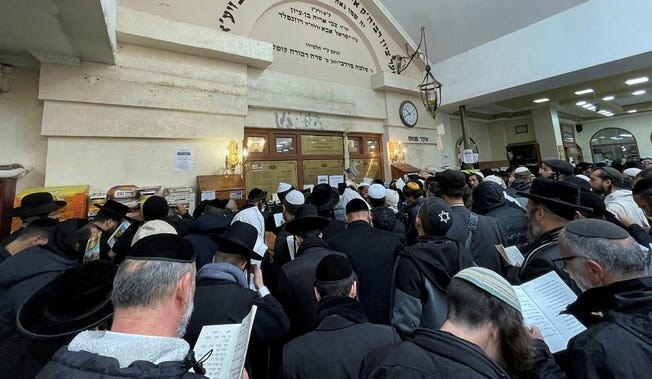Netanyahu warns Jewish pilgrims not to visit Ukraine for Rosh Hashanah
There are only enough shelters in the small Ukrainian city of Uman for around 11,000 people, creating a potentially perilous scenario for the tens of thousands of Jews who are expected to make the pilgrimage this year

Jewish pilgrims celebrating Rosh Hashanah in Uman, Ukraine, 2022. Photo by Sam Sokol/Haaretz
This article originally appeared on Haaretz, and was reprinted here with permission. Sign up here to get Haaretz’s free Daily Brief newsletter delivered to your inbox.
Israelis travelling to Rabbi Nachman of Bratslav’s tomb in Ukraine over the upcoming Rosh Hashanah holiday are taking their lives into their own hands, Prime Minister Benjamin Netanyahu warned on Sunday, citing a lack of bomb shelters in the pilgrimage city of Uman.
Despite approving a budget of 4 million shekels (about $1 million) to facilitate the entry of Israelis into the Eastern European nation, Netanyahu spoke out against traveling to Uman, stating that while tens of thousands of Jews are expected to show up, there are only enough shelters in the small Ukrainian city for around 11,000 people.
“God did not always protect us, including in Europe and on the soil of Ukraine,” he said, adding that “in the State of Israel, when rockets fall, civilians go into shelters and there are protections, [but in Ukraine] there are no shelters and no protections.”
Netanyahu’s warning came only days after discussing the pilgrimage, which is an important issue for the ultra-Orthodox parties in his coalition, with Ukrainian President Volodymyr Zelenskyy. Despite pushing for the interests of the Haredi community, however, his comment about divine providence was panned by the ultra-Orthodox news site Behadrei Haredim, which described it as a “heretical statement.”
The ultra-Orthodox Shas party responded saying: “[God] has always protected the people of Israel … which is why it is the only people that has survived miraculously for thousands of years.” The statement says that “the condition for this divine providence is … observing the Torah and the commandments as the Jewish people has done since its origin.”
Korniychuk Yevgen, Ukraine’s ambassador to Israel, recently cautioned that Kyiv may refuse entry to Israelis and cancel the visa waiver agreement between the nations if Israel does not change its attitude toward Ukrainian asylum seekers in Israel.
Korniychuk had issued a similar threat which did not result in a ban last year, leading Israeli officials to dismiss his concerns, although Jerusalem did later decide to cut the state budget to fund health services for Ukrainian refugees.
Every Rosh Hashanah, tens of thousands of Israelis take part in the annual pilgrimage to the tomb of the revered Hasidic leader Rabbi Nachman of Bratslav, transforming the sleepy town of Uman, some 200 kilometers (around 124 miles) south of Kyiv, into a major tourist attraction.
But even faced with Ukrainian and Israeli pleas to stay away, an estimated 23,000 worshippers arrived in Uman last year, streaming over the border from neighboring Moldova, Romania and Poland. Direct travel between Israel and Uman was impossible because Ukraine shut down its airspace to civilian traffic following Russia’s invasion last February.
They traveled despite the Security Service of Ukraine, Ukraine’s domestic security agency, warning that Russia could use the “mass gathering of pilgrims to stage provocations.”
Moscow has long used allegations of Nazism and antisemitism to legitimize its actions against Ukraine, and last March, Russia’s Defense Ministry alleged that Ukrainian forces were storing weapons and ammunition in an Uman synagogue, prompting strong denials from the local Jewish community.
Regarding Israeli efforts to help handle the influx of worshippers despite official objections to the pilgrimage, Joel Lion, Israel’s nonresident ambassador to Moldova and its former envoy in Kyiv, told Haaretz last month that “it’s dangerous to go there, but the State of Israel cannot leave the people going to Uman alone and not do everything to make [their journey] smooth.”
During last year’s holiday, both pilgrims and locals seemed largely unconcerned with the occasional air raid sirens that sounded in Uman, a city which had been largely spared by the conflict.
But this April, over 20 people were killed when a Russian missile hit an apartment building in Uman, making the possibility of a mass casualty event seem much more likely.
Tensions have been mounting between Kyiv and Jerusalem since the beginning of the Russian invasion last February – largely over Israel’s refusal to provide Ukraine with arms, its treatment of Ukrainian refugees, and its continuing ties with Russia.
Last week, the Ukrainian embassy in Tel Aviv condemned Israel’s decision to sign an agreement for cooperation in the field of cinema on the same day that a Russian strike hit a crowded market in eastern Ukraine. One day prior, Russian President Vladimir Putin had accused the West of installing “an ethnic Jew” as Ukraine’s leader in order to “cover up” the country’s alleged fascist nature.
This summer, the Ukrainian embassy, in its harshest criticism to date, accused Israel of maintaining “a clear pro-Russian position” despite protestations of neutrality.
A message from our CEO & publisher Rachel Fishman Feddersen
I hope you appreciated this article. Before you go, I’d like to ask you to please support the Forward’s award-winning, nonprofit journalism during this critical time.
We’ve set a goal to raise $260,000 by December 31. That’s an ambitious goal, but one that will give us the resources we need to invest in the high quality news, opinion, analysis and cultural coverage that isn’t available anywhere else.
If you feel inspired to make an impact, now is the time to give something back. Join us as a member at your most generous level.
— Rachel Fishman Feddersen, Publisher and CEO